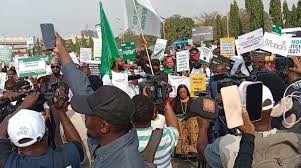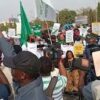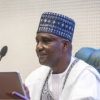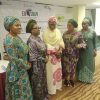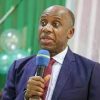Confusion on Monday enveloped the political sky in Rivers State especially the scheduled October 5 2024 Rivers State Local Government Areas election as courts of coordinate jurisdiction issued conflicting rulings on the election. A State High Court, Port Harcourt, Rivers State Division, presided over by Justice I. Igwe ordered the Rivers State Independent Electoral Commission
Confusion on Monday enveloped the political sky in Rivers State especially the scheduled October 5 2024 Rivers State Local Government Areas election as courts of coordinate jurisdiction issued conflicting rulings on the election.
A State High Court, Port Harcourt, Rivers State Division, presided over by Justice I. Igwe ordered the Rivers State Independent Electoral Commission (RSIEC) to conduct the forthcoming local government elections in the state, using the 2023 voters’ register. The voters’ register was compiled by the Independent National Electoral Commission.
Justice Igwe also mandated the Nigeria Police Force, and the Nigeria Security and Civil Defence Force to provide necessary protection during the election process. The orders were given in a case instituted by the Action People’s Party (APP) against the State Electoral umpire, the Rivers State Government, and the Governor of Rivers State.
In the orders which were given on 4 September 2024, the Judge said the defendants are bound by Section 7, sub-section 1 of the Constitution and Section 5 (A) of the RSIEC Law Number 2 of 2018 to make provisions and conduct the local government polls within the shortest possible time, especially following the expiration of the tenure of the former elected officials on June 17.
The court also cited as a necessity, the recent decision of the Federal Government mandating states without democratically elected local government to do so within three months, following the judgment of the Supreme Court on local government autonomy. The Court urged that all necessary arrangements be made to ensure the conduct of the election on October 5, 2024, as announced by RSIEC.
But another Federal High Court in Abuja presided over by Justice Peter Lifu on Monday, six days before the conduct of the Rivers State local government area election, restrained the Independent National Electoral Commission, (INEC), from releasing voters’ register to the Rivers State Independent Electoral Commission, (RSIEC), to conduct the 5 October, 2024 local government election in the state.
The court also barred the Inspector General of Police (IGP) and the Department of the State Service (DSS) from participating and providing security for the conduct of the local government area election.
Justice Lifu issued the order while delivering judgment in a suit brought before him by the All Progressives Congress (APC) challenging the legality or otherwise of the processes leading to the fixing of 5 October 2024 for the election.
The suit was argued on behalf of the APC by a team of Senior Advocates of Nigeria (SAN)comprising Mr. Joseph Daudu, Mr. Sebastine Hon, and Dr. Ogwu James Onoja.
Justice Lifu held that the RSIEC was wrong in fixing the 5 October 2024 date for the conduct of the poll when all relevant laws guiding the election had not been complied with. According to him, the Rivers State electoral body violated provisions of the local government election conduct law by not publishing the mandatory 90-day notice before fixing the date.
He also held that the update and revision of the voters’ register by INEC ought to have been concluded 90 days before an election date can be legally and validity fixed in law. He, therefore, ordered INEC not to make the certified voters’ register available to RSIEC until all relevant laws have been fully complied with.
Justice Peter Lifu also barred RSIEC from accepting any voters’ register from INEC or using it for the October 5 local government poll.
The APC had dragged INEC, RSIEC, Rivers Attorney General, Inspector General of Police, and the Department of the State Service DSS alleging irregularities and outright violations of laws in the ways and manners the Rivers state government was handling the election matters.
The party through its counsels alleged that the mandatory provisions of law for publication of election notice 90 days before the election conduct was jettisoned. APC also claimed that the mandatory conclusions of updating and revision of voter register 90 days before the election were not complied with.
On 11 July 2024, the Supreme Court gave a landmark judgment on the financial autonomy of Nigeria’s 774 local governments. The apex court also condemned the dissolution of elected local government councils by state governors.
A seven-member panel of the Supreme Court, chaired by Justice Mohammed Garba, disagreed with the position of the state governments and concluded that the plaintiff’s (FG) case had merit.
Reading the judgement, Justice Emmanuel Akomaye Agim stated: “It is the position of this court that the federation can pay local government allocations directly to the local governments or through the states. In this case, since paying them through the states has not worked, justice demands that local government allocations from the federation account should henceforth be paid directly to the local governments,” adding that “I hold that the states’ retention of local government funds is unconstitutional.”
According to Justice Agim, for the last two decades, the states have been retaining funds due to the local governments and disbursing them at their whims and caprices, contrary to the constitutional provision.
The state’s decision to withhold allocations to local governments has grounded many of Nigeria’s 774 local governments and rendered most useless. It has brought untoward hardship to the citizens, who should enjoy the dividends of democracy at the grassroots.
The apex court declared that allocations belonging to local governments must be paid to local government councils that are democratically elected, this will hopefully stop the existing undemocratic practice.
Consequently, there is an urgent need to have an independent electoral body to run the local government elections in the states. Most State Independent Electoral Commissions (SIEC) are enmeshed in corrupt practices and carry out electoral fraud while most of them have been widely accused of conducting sham elections.
Shortly after the judgement on 11 July 2024, the federal government and state government through the Nigeria Governors’ Forum met and agreed that the judgement should be implemented after three months to give room for local government areas without democratically elected officials to do the needful.
Monday’s ruling by Justice Lifu appears to contradict the warning of the National Judicial Council (NJC) that judges of coordinate jurisdiction should be restrained from issuing conflicting rulings. Rather, litigants were advised to appeal rulings or judgments instead of approaching another court of coordinate jurisdiction.
1 comment


